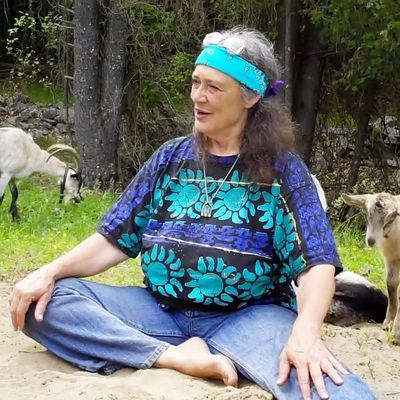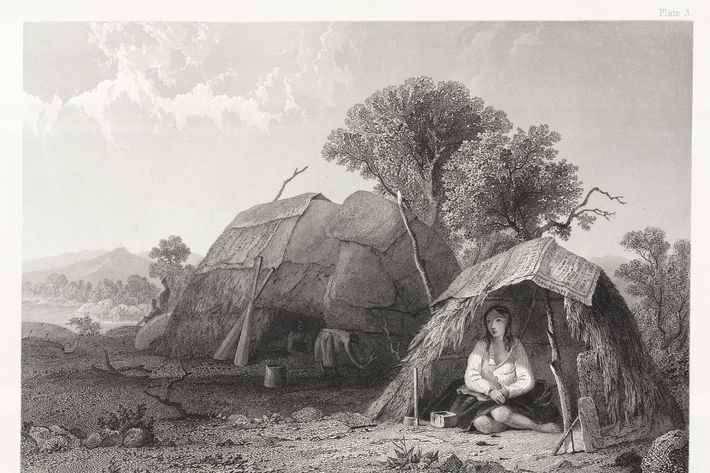
We sit silently, the 12 of us women, in a wooded clearing on the 55-acre property of the Wise Woman Center. After a series of chants, dances, and songs, we settled in this circle from oldest to youngest, here on a farm outside of Woodstock, New York.
We’re at a moon lodge, and we’re here to celebrate our periods.
Susun Weed is leading the group. She’s an intimidating woman in her late 60s, wild gray hair tamped down with a handkerchief worn Willie Nelson–style. She emanates strength and a kind of hard dignity.
She starts telling us a story, in her booming, witchy voice, about how she was part of a group of women in the ‘70s who decided they needed to save the Earth. A wise woman teacher told them, “That’s ripe ego, to say you can save the Earth. The Earth will outlast all of us.” But her teacher did have one piece of advice about what the women could do for the Earth: They could give their menstrual blood to it.
Thus was the Woodstock moon lodge born.
***
Susun Weed is an herbalist, an author, and the director of the Wise Woman Center in Woodstock. I first heard of her while researching herbal remedies, and became enamored with her after reading on her website that “she left high school in her junior year to pursue studies in mathematics and artificial intelligence at UCLA and she left college in her junior year to pursue life.” She began hosting moon lodges in 1983.
The lodges are meant to evoke an ancient tradition of women secluding themselves during their periods (which usually aligned with the other women nearby) and using that time to speak freely with each other about conflicts, emotions, and hardships. They also drank wine and ate sweets, and they sat on hay and bled. Nowadays, women’s schedules aren’t quite so synced up, what with birth control and many other modern-day factors, but Weed says that’s not really the point.

“That’s a male-identified way of thinking,” she admonished me when I asked her if her moon lodges were complicated by the fact that women don’t all menstruate at the same time. “There is no right way or right time to have a cycle.”
I’d always wondered, since long before I got my own, what women of ancient times used to do during their periods. I’d seen the pictures of the old-fashioned maxi pads that fastened onto belts. And for my entire life, I, like everyone else, have been bombarded with “feminine hygiene” commercials in which white women pour blue liquid on pink panty-liners.
Weed’s concept of a period as a time to retreat from the outside world, to go within myself, and to be around other women spoke to me. More and more lately, living in New York City, I’ve come to see “girl time” less as a fun activity and more as a genuine need. And the idea of Woodstock, a place I’d never been, intrigued me.
Still — when we jumped in to chanting and dancing with barely a word of introduction, out there among the trees of the Catskills with the mosquitos biting zig-zags up my back through my flannel shirt — I was legitimately uncomfortable. It’s one thing to desire solidarity and appreciate the idea of communing with other women; it’s quite another to ignore the loud farts of middle-aged hippie women as we bare our souls to each other in the dark woods.
Early on, though, as I was trying to catch the words to songs about “opening my womb with delight,” I decided that I was going to have to let my resistance go and give in to the lodge. Plus, after the chanting, Weed started speaking about the quest she and a group of other women embarked on in the ‘70s to find a way to staunch their monthly blood flow without “paying the man” for tampons. As a recent convert to a Diva Cup, I was intrigued.
“Moss is great!” she bellowed at us in her commanding voice. “But not in your underwear in the supermarket.”
In addition to the moss, the women tried actual rags (“there’s kind of a chafing problem there”) and chamois leather (which felt lovely but dried into bricks after being washed, and was too expensive to replace) before settling on a method they liked: ecologically harvested sponges, placed inside the vagina like a tampon.
Then she decided to experiment with “letting it flow,” wearing nothing at all while on her period, instead focusing on sensing when her blood was flowing, before it even left her body, and “catching it” as it came out. She said that along with a heightened awareness of her body’s functioning, the practice resulted in a super-sensitive emotional state.
After Weed addressed us, we were to each take the “talking scarf” and speak, starting with the oldest women and ending with the youngest, who was 24. Everyone was really uninhibited. Some spoke about simple things, like making nettle soup and letting the nettles sting her hands; and some aired out some pretty heavy experiences. One silver-haired Irish woman told a 40-minute heart-wrenching yarn about the death of her alcoholic brother.
And although no one actually “bled into the Earth” during the moon lodge (I wasn’t close to my period at the time), one of the younger women, who was apprenticing on the farm, told us that earlier in the day, she had come to where we were sitting, taken off her pants and underwear, sat in some moss, bled into it, and wept. A few women wept openly during their turn to speak, in fact. It was pretty intense.
As the night darkened, our faces became harder to make out. We became more like presences than actual people, voices of pain and joy and gratitude coming out of the dark. When the youngest woman was speaking, big, slow raindrops began to fall.
We closed with a song in the darkness, as the rain fell heavier. No one rushed to move. After three verses about returning to the darkness of a mother’s womb, we slowly got up, filed out of the woods, got into our cars, and left.




